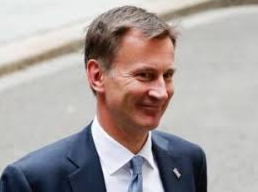
Chancellor’s upcoming fiscal plan to address financial instability amidst soaring interest rates and global economic pressures
The Chancellor, Jeremy Hunt, is set to unveil a detailed fiscal strategy on November 17 aimed at reducing the UK’s national debt, a key move to maintain economic stability, according to a Treasury minister. In the wake of financial uncertainty, including significant interest rate hikes, the government plans to take “difficult decisions” but assures that protections for the most vulnerable will remain a priority.
Baroness Penn, a Conservative peer, made the remarks following a turbulent period in the UK’s economy, including a sharp interest rate increase by the Bank of England to 3%, marking the steepest rise since 1989. This increase is expected to add approximately £3,000 annually to the mortgage bills of households due to renew their loans. The Bank of England also cautioned that the UK may face its longest recession on record.
Jeremy Hunt’s upcoming fiscal announcements are expected to include up to £50 billion in spending cuts and tax hikes, as the government grapples with a significant fiscal shortfall. The Chancellor had previously abandoned large-scale, debt-funded tax cuts introduced in the ill-fated September mini-budget, which led to financial market turmoil and the swift end of Liz Truss’s tenure as Prime Minister.
Lady Penn addressed these developments in a debate on financial stability in the House of Lords, acknowledging the unintended consequences of the previous growth plan, which triggered economic instability. “Mistakes were made, and we have taken steps to fix them,” she remarked. Most of the tax policies from the growth plan have been reversed, contributing to a reduction in market volatility.
However, the Treasury minister emphasised that the UK continues to face significant economic challenges, exacerbated by global inflationary pressures, rising energy prices following Russia’s invasion of Ukraine, and labour shortages. Central banks in major economies have raised interest rates in response to these challenges.
“The Chancellor has made it clear that we will take the necessary actions to restore confidence in the UK’s public finances and to navigate the global economic shocks,” Lady Penn stated. “This will involve difficult decisions, but we are committed to protecting the most vulnerable in society.”
She added that the government’s primary focus will be on ensuring economic stability, with the Chancellor planning a comprehensive strategy to reduce debt over the medium term. The government is also committed to fostering growth and job creation to strengthen the UK’s economy and resilience.
Earlier, Lord Bilimoria, former president of the Confederation of British Industry (CBI), spoke on the widely criticised mini-budget. He agreed that the growth intentions and tax cuts were sound but criticised the timing, which coincided with the ongoing cost-of-living crisis. “The intentions for growth and tax cuts were good,” he said. “But timing is everything.” He referenced the “irrational exuberance” of former Prime Minister Liz Truss and ex-Chancellor Kwasi Kwarteng, highlighting the importance of how policies are implemented.












